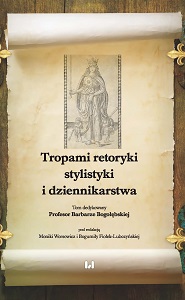Filozofia Karola Wojtyły wobec problemu moderny
Karol Wojtyła’s Philosophy on the Problem of Modernism
Author(s): Alfred Marek Wierzbicki
Subject(s): Language and Literature Studies, Applied Linguistics
Published by: Wydawnictwo Uniwersytetu Łódzkiego
Keywords: personalism;modernism;awareness;subjectivity;freedom;conscience
Summary/Abstract: The specificity of Karol Wojtyla’s anthropology is the synthesis of objectivity and subjectivity, which combines alletic and agapical motives. On the one hand, by accepting the modern anthropological turn, he attempts to synthesize classical philosophy of being with the philosophy of consciousness, and on the other, he strives to correct the extreme anthropocentrism of modern thought. The author of the article analyzes Wojtyla’s relationship of awareness and subjectivity with the personal style of the pastoral ministry of John Paul II, who proclaimed man as “the main way of the Church”. The other pillar of analysis is the question about the meaning of human freedom. In Wojtyla’s thought and in the teachings of John Paul II, considerations about freedom as the basic property of human being are combined with a reflection on its ethical dimension.
Book: Tropami retoryki, stylistyki i dziennikarstwa. Tom dedykowany Profesor Barbarze Bogołębskiej
- Page Range: 167-179
- Page Count: 13
- Publication Year: 2019
- Language: Polish
- Content File-PDF

